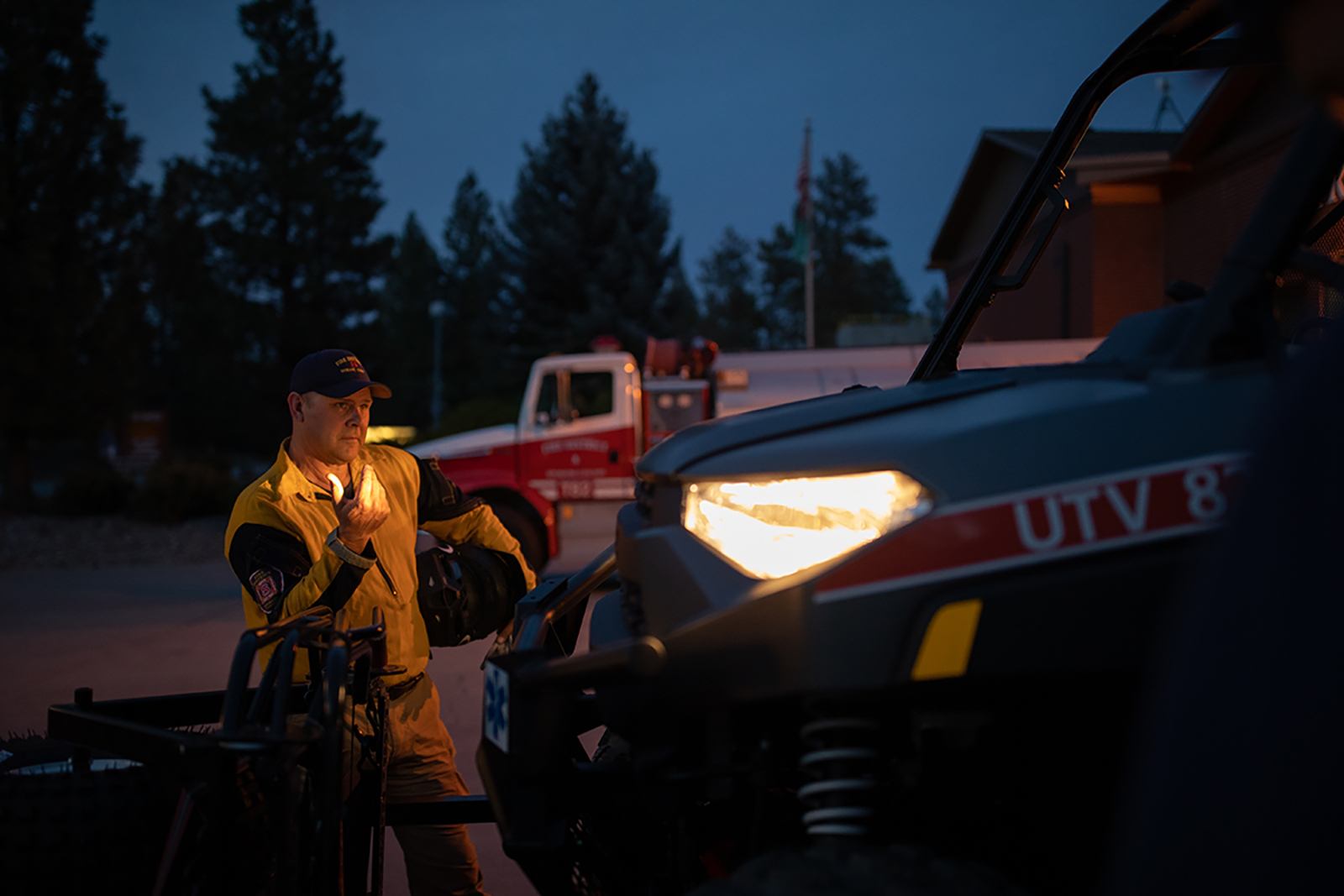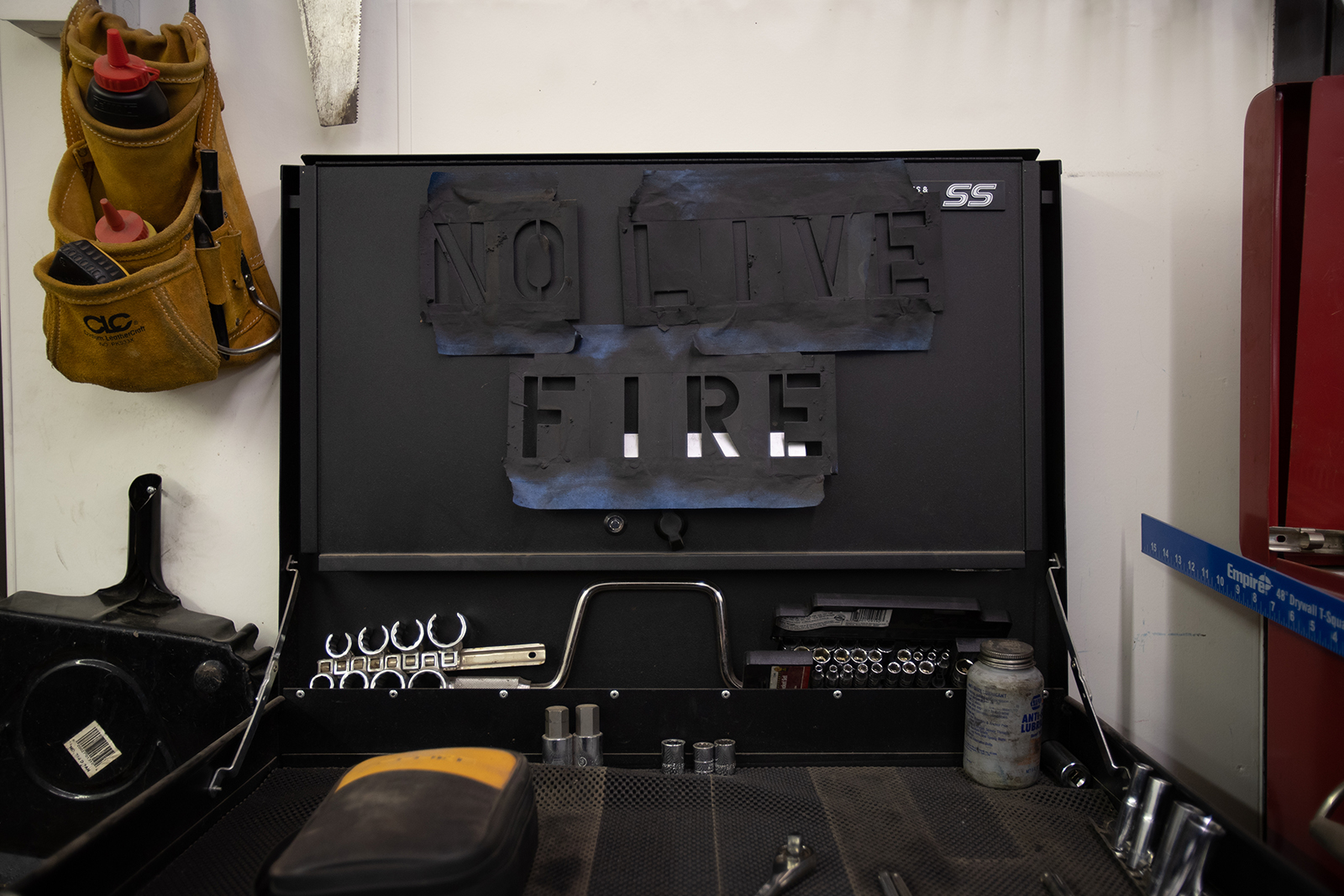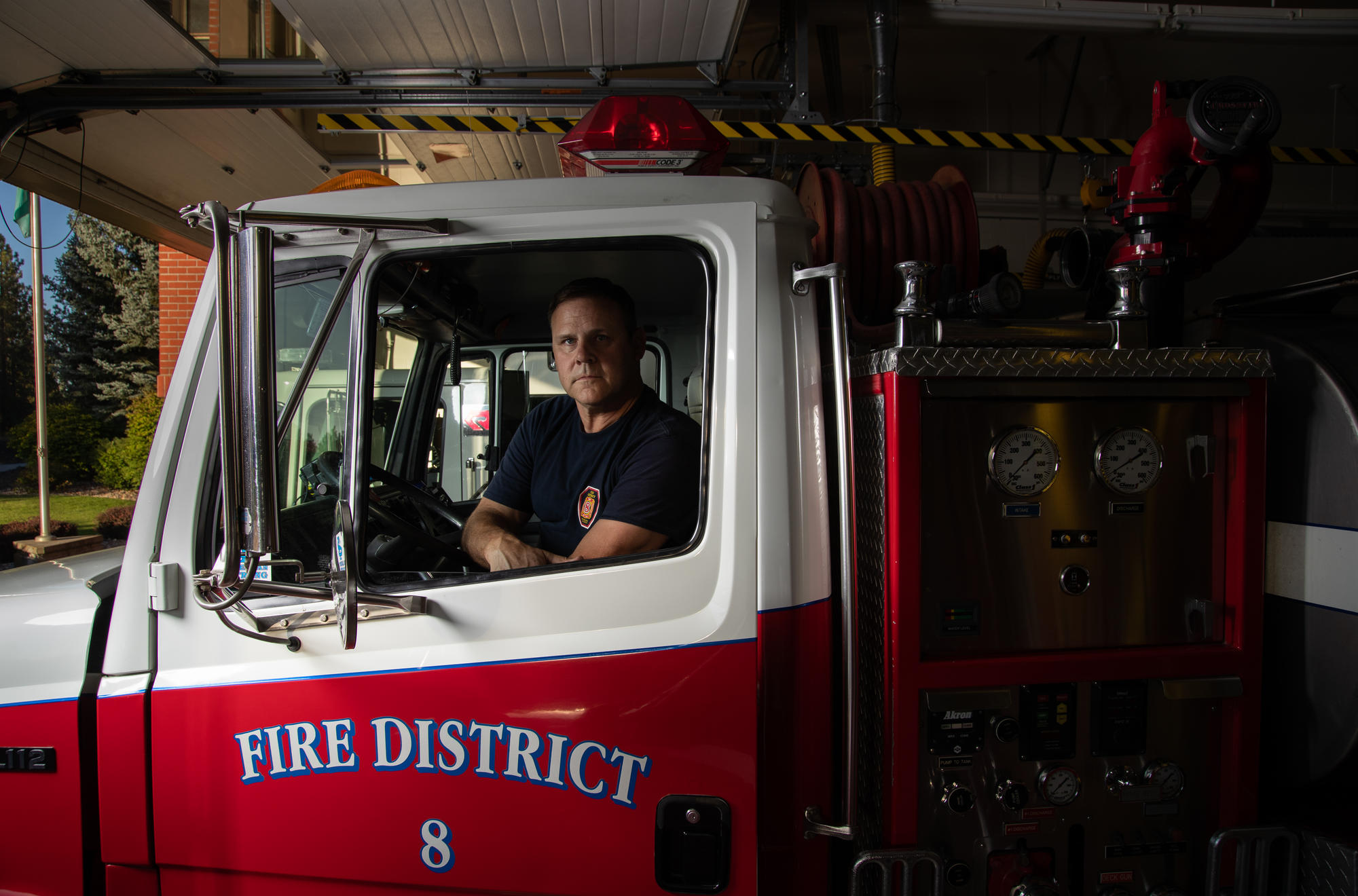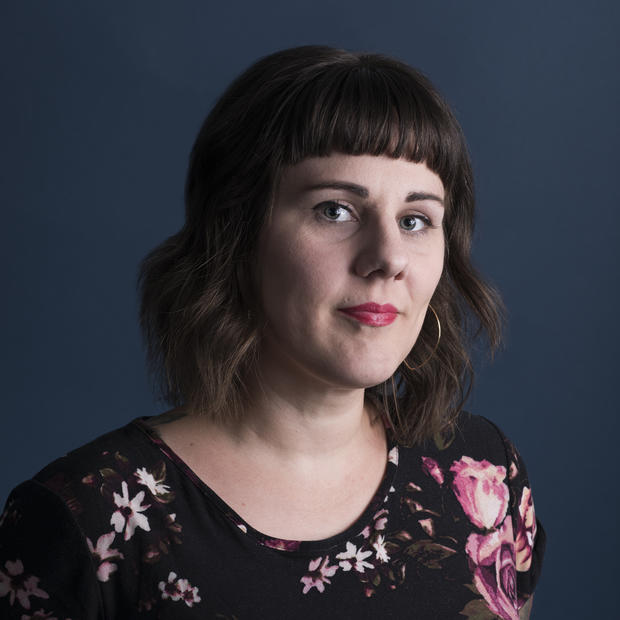He worked the Tubbs Fire in California in 2017, the most destructive wildfire in California at the time. There were 22 fatalities. In his division, there were six missing people. That was the first time he saw cadaver dogs, whose job was finding bodies in piles of rubble.
He was at the 2014 Carlton Complex Fire in the Methow Valley, which killed two. He remembers the pungent smell of burnt cows from a farm that had lost 250 cattle. He also fought next to the Okanogan Complex Fire in 2015, where three firefighters died. In California, a nearby division had a firefighter who died in a water truck rollover.
“I think every firefighter has some form of PTSD — there’s things you cannot shelter yourself from this job that you will be exposed to, and over time, it just builds up,” Hatley says. “It damages your life, damages your well-being, and I think going on all these calls each and every day, you’re exposed to something that over time causes damage.”
Hatley is now division chief with Spokane County Fire District 8, where he’s been for 10 years. He still struggles with the side effects of his PTSD, or post-traumatic stress disorder, which he manages through counseling and other support systems. Hatley says his personal life is also affected, and sees that echoed in his relationship with his wife.
“The sights and sounds, the smells, have definitely resonated with some of my issues … during times, you have little flashbacks,” he says. “Those things you just can’t delete from your brain.”

Though the summer of 2019 has been quieter for wildfires in Washington, firefighters risk life and limb on even smaller wildfires. Christian Johnson, assistant fire chief of the Okanogan Volunteer Fire Department, suffered second- and third-degree burns to more than half of his body while fighting the 142-acre Spring Coulee fire. He expects to need skin grafts and months of recovery time in Harborview’s intensive care unit. The mental trauma associated with his injuries — for him and fellow firefighters — could take years to heal.
Conversations about how to assist wildland firefighters struggling with PTSD are happening more often, as the illness becomes less stigmatized, says Rich Elliott, deputy fire chief of Kittitas Valley Fire and Rescue. But Elliot remains concerned, mostly because he believes there’s more of a support network for structural firefighters than for wildland firefighters.
“The wildland fire community is behind the other groups, but we're trying to help them and lead them in the right direction. They're working on it themselves, but it is absolutely an issue,” Elliott says. “We're seeing suicide, all sorts of bad outcomes associated with this profession, wildland firefighting, and we need to do what we can to reverse those trends and give people tools [to cope].”
Kittitas Valley Fire and Rescue has a structured debriefing process and a mental health professional available 24 hours a day. But Elliott recognizes that not every team has that resource, and the seasonal nature of wildland firefighting presents unique challenges.
“Most people in the fire departments, we’re Type A, you’re there to fix things,” he says. “We had a [sheriff's] deputy killed here four months ago. Everybody knew him. We did CPR on him for an hour. It was just horrific. Those kinds of things, they never go away.”
The trauma associated with wildland firefighting can work its way up the chain of command. Kennewick Fire Department Capt. Chris Hutsell is also a Type 1 operations section chief — the top of the management tier for national wildland fire incident response. This year, he was called to the Shovel Creek Fire in Fairbanks, Alaska. During wildfire incidents like that one, he helps make tactical and strategic decisions that can affect the safety of a thousand people or more. That responsibility can come as a heavy burden.
“We’re always asking people to [take] some risk,” he says. “Are we always putting people in the right places? And using the right tool for the job?

In August 2013, when Hutsell was branch director on the Big Windy Complex Fire in southern Oregon, 19-year-old Jesse Trader, a firefighter on his team, died when a water tanker rolled over while Trader was driving.
“It’s always in the back of your mind, and it’s always a concern that it could happen on any fire,” Hutsell says.
He says that during wildland fire incidents, human resource specialists are available who are trained to help with mental health resources. However, for seasonal workers, that help often stops when the fire season ends.
“When you leave your team or whichever group you’re working with, you’re kind of out there on your own — who do you turn to?” he says. “Contract crews [are] hired to do a job, and they work for a private company and those companies may not have the ability to find a support network for them.”
Hutsell leans on the support of his wife, a mental health professional who recognizes his triggers. Hutsell’s PTSD often takes the form of “anniversary anxiety” accompanying anniversaries of traumatic events.
“We as firefighters believe that we're tougher than all, and we can do it all, and we don't need help, but we do need help,” he says. “It is hard for individuals to open up because you feel like, ‘I’m strong, I have to be strong, people rely on us.’ But they have to; otherwise it’ll just eat at them.”
One program designed to help first responders of all disciplines deal with PTSD is Code 4 Northwest, founded in 2013 by Seattle police officer Steve Redmond. It’s a 24/7 resource hotline for first responders experiencing PTSD, addiction or mental health issues. Code 4 is staffed by volunteers, including Redmond, and most are retired firefighters, dispatchers or police. They provide peer-to-peer support that Redmond says is lacking elsewhere.
He’s been an officer for 20 years. He suffers from PTSD himself, from an incident in which a gun was put to his head. He says while his job is dangerous, wildland firefighters might be more at risk for mental health issues.
“Firefighters, hands down, have the most dangerous job out there,” he says. “In 30 seconds, it can go from ‘OK’ to ‘not OK.’ These young kids who are doing this, they’re dealing with the worst and most aggressive situations you can imagine. Life or death situations. They really have no support on the back end.”
Redmond also worries that the seasonal nature of the work prevents access to insurance or trauma treatment centers full-time first responders have.
“It’s really sad to see because it’s like they’re disposable income,” he says. “I don’t like to see that. So we’ll give scholarships to people, if they reach out to us and need to get to a treatment center.”
Burk Minor is the incoming executive director of the Wildland Firefighter Foundation in Boise, Idaho. His mother started the organization after 14 men and women were killed in the 1994 Storm King fire in Colorado. They now provide services nationwide. Minor thinks demand for mental health services will increase, especially as fire seasons lengthen and intensify, drawing firefighters back into the field before they’ve fully recovered.
“That's your thing with wildland fires, it really doesn't say timeout,” he says. “So they go back out, and they bury it, and they get what I call scabs. Whatever peels that scab, things fall apart with them.”
The foundation has a trauma therapist on call that can reach out to firefighters with PTSD, those who are contemplating suicide or those suffering from other mental health crises. They also aim to support the families of those affected.
“We're basically the safety net for the community. Our mission statement is to sustain the home of a killed or injured wildland firefighter,” he says. “But over the years, 25 years of doing this, we know there's a lot more out there that needs to be dealt with, and we do that as well. We just do whatever it takes for the boots on the ground.”
Minor worries especially about the “salty old dogs” — veterans in the industry who come from a time when mental health injuries weren’t discussed, and are therefore harder to reach.
“There would be old school loggers that, you know, they’re never going to talk to a therapist,” he says. “I think this new breed of kids are more apt to talk about it.”
Hatley, the Spokane County Fire division chief, is one of those veterans who only recently came to terms with his need to reach out for help. More firefighters are talking about it and removing some of the stigma, he says, and he sees hope in that.
“I grew up in the day and age, when I first started in the fire service, where you suck it up,” he says. “There was nobody to talk to. You just had to deal with it on your own.”
“This is actually kind of a coming out — if I can help anybody, just one person, it’s worth it,” he says. “Those firefighters out there that are having issues — there's no shame in that. We all go through these stressful situations, and we all deal with them in different ways, but I would just say there are programs out there to help them.”



